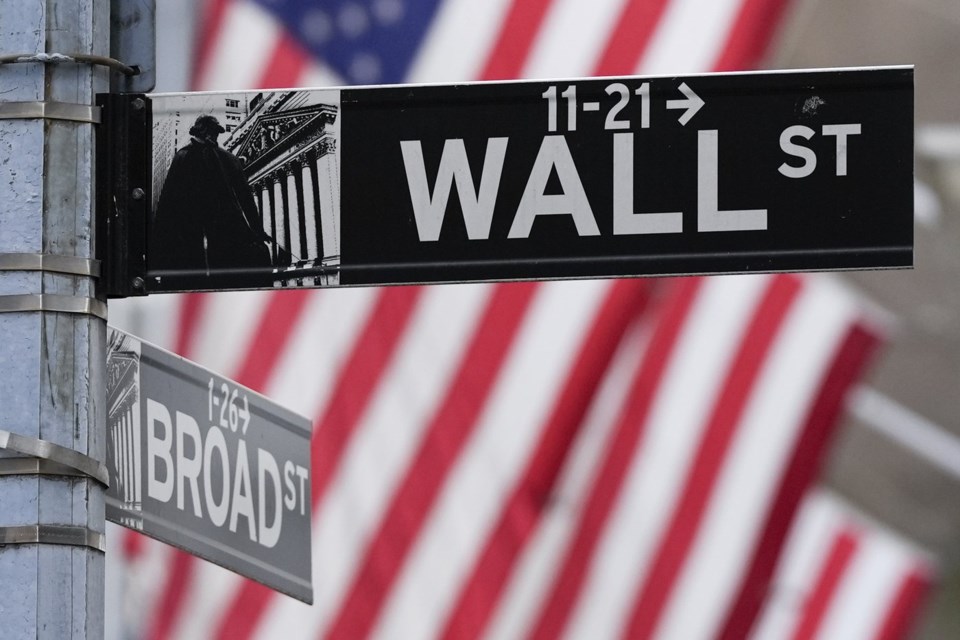NEW YORK (AP) — Wall Street edged lower Thursday after getting pulled in opposite directions as latest creates .
The S&P 500 slipped 0.3% after drifting between small gains and losses several times through the day. data on the also helped support the market. The Dow Jones Industrial Average dipped 155 points, or 0.4%, and the Nasdaq composite fell 0.5%.
General Motors sank 7.4% for one of the market’s sharper losses after Trump announced 25% tariffs on imported cars. Ford Motor dropped 3.9%.
Even selling vehicles in the country can feel the pain of such tariffs because their supply chains are spread throughout North America. Trump says he wants more manufacturing to take place within the United States.
“There are still a lot of unknowns, but if this remains in place, there will clearly be some pain for the companies to digest,” according to UBS analyst Joseph Spak.
Among the uncertainties are how the U.S. government will determine how to apply tariffs to parts that are compliant with the free-trade agreement that the United States and Mexico and Canada have, but are not made entirely within the United States. Tracking parts could be difficult, according to Spak.
Automakers based outside the United States also sank. In Seoul, Hyundai Motor dropped 4.3%. In Tokyo, Honda Motor fell 2.5%, and Toyota Motor lost 2%.
But U.S. electric-vehicle makers Rivian and held up much better. They look to face less pressure from Trump’s tariffs because more of their production happens in the United States.
Rivian rallied 7.6%, and added 0.4% after paring an earlier, bigger gain.
Companies that could benefit from drivers opting against buying new cars also revved higher. Among auto parts retailers, AutoZone gained 4%, and O’Reilly Automotive climbed 3.1%. CarMax, which sells used autos, rose 2.5%.
Expectations are high for stock markets worldwide to remain shaky as an April 2 deadline approaches for tariffs. That’s what Trump has called “Liberation Day,” when he will roll out tariffs tailored to the United States’ trading partners. In each case, he said the “reciprocal” tariff will match the burden the other country places on the United States, including things like value-added taxes.
Hopes are still high that Trump may ultimately opt for more targeted or milder tariffs that are less painful for the global economy than feared. But even if he does, all the talk about tariffs has already made U.S. and businesses feel more cautious and pessimistic. If such sour moods convince them to pull back on their spending, it could hurt the economy.
So far, the economy has seemed to be holding up.
One report on Thursday said slightly fewer workers applied for last week than economists expected. It’s the latest sign the job market may be settling into a “low fire, low hire” state.
A second report said the U.S. economy’s growth during the final three months of last year was than earlier estimated.
The better-than-expected data helped Treasury yields in the bond market remain relatively steady. The yield on the 10-year Treasury edged up to 4.36% from 4.35% late Wednesday.
On Wall Street, Petco Health & Wellness jumped 31.6% after the retailer reported slightly stronger results for the latest quarter than analysts expected.
All told, the S&P 500 slipped 18.89 points to 5,693.31. The Dow Jones Industrial Average dropped 155.09 to 42,299.70, and the Nasdaq composite fell 94.98 to 17,804.03.
In stock markets abroad, indexes fell across much of Europe after finishing mixed in Asia.
Japan’s Nikkei 225 fell 0.6% following the losses for many of its automakers, and Japanese Prime Minister Shigeru Ishiba said Thursday, “We strongly request that tariff measures not be applied to Japan.”
In China, stocks rose 0.1% in Shanghai and 0.4% in Hong Kong.
Chinese automakers and parts manufacturers have been expanding sales around the world, but not in the United States, so any impact from the tariffs announcement would be an indirect one.
___
AP Business Writers Yuri Kageyama and Matt Ott and AP Videographer Ayaka McGill contributed.
Stan Choe, The Associated Press




